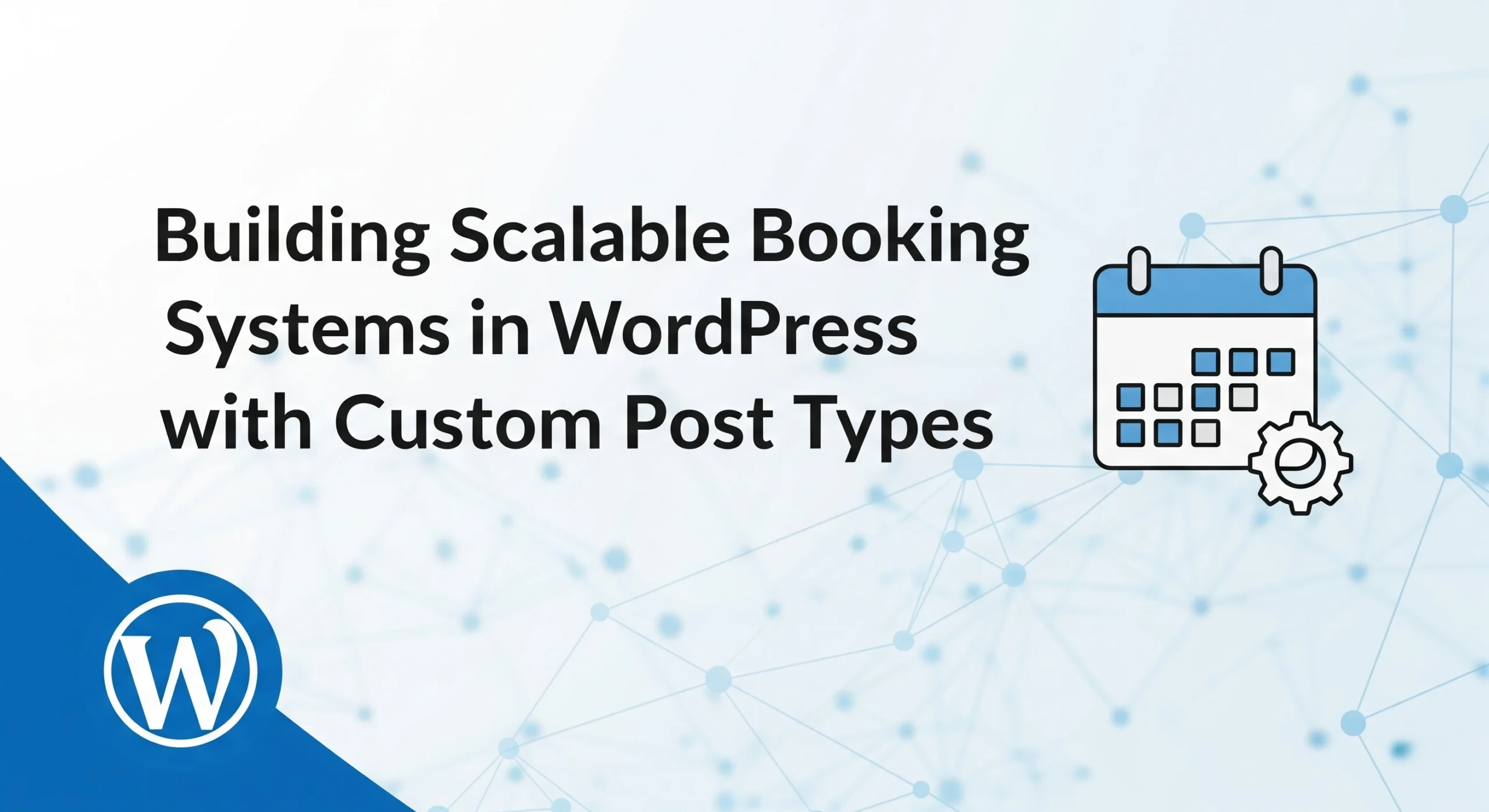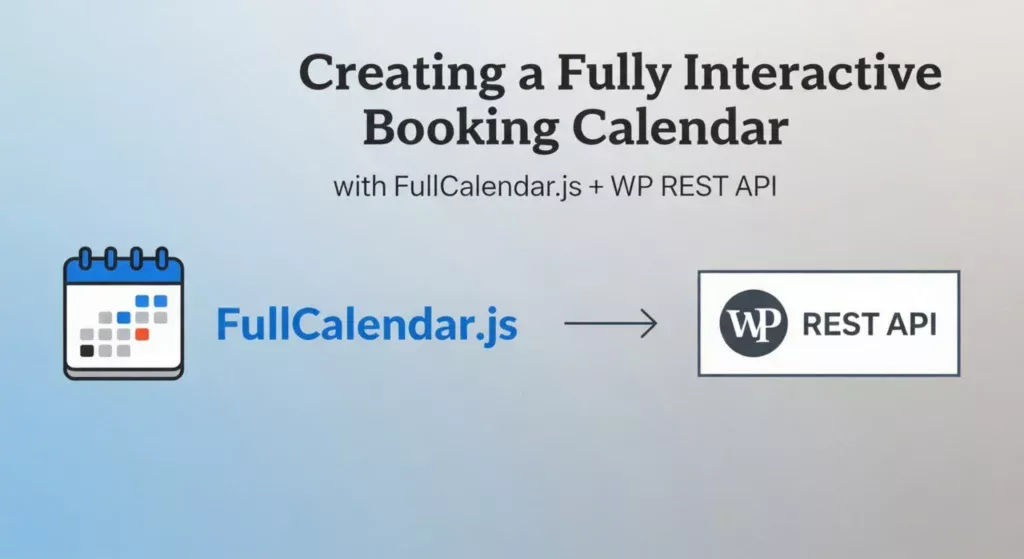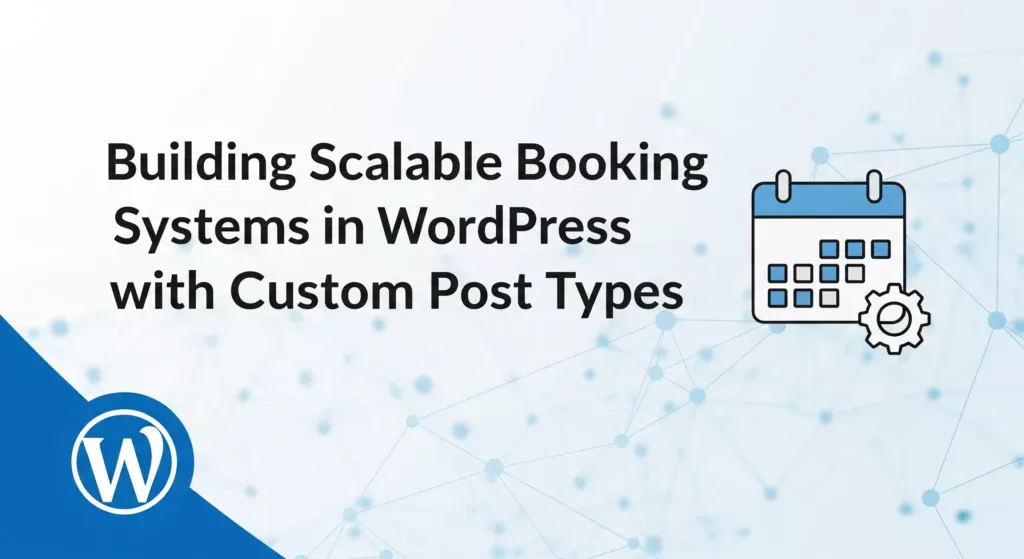Introduction
Booking systems are among the most common requirements for businesses—whether for appointments, classes, events, or services. While many plugins exist, building a custom, scalable booking system in WordPress gives you full control, flexibility, and performance benefits.
At the heart of this approach lies one of WordPress’s most powerful features: Custom Post Types (CPTs). By modeling bookings, services, and staff as CPTs, developers can create a highly extensible system that integrates seamlessly with WordPress core functionality.
Why Use Custom Post Types for Bookings?
Custom Post Types allow you to:
- Model real-world entities like bookings, services, staff, and customers.
- Leverage built-in WordPress features (REST API, WP_Query, taxonomies).
- Scale easily with large datasets through custom queries and indexes.
- Integrate with third-party tools like FullCalendar, WooCommerce, or CRMs.
- Customize admin interfaces with meta boxes, columns, and filters.
Designing the CPT Structure
A scalable booking system often requires multiple CPTs:
- Bookings (
bookings) → Stores appointment details. - Services (
services) → Defines service type, duration, and cost. - Staff (
staff) → Associates staff with services. - Customers (
customers) → Manages client details.
Example CPT registration for Bookings:
function register_booking_post_type() {
register_post_type('bookings', [
'labels' => [
'name' => __('Bookings', 'bookwp'),
'singular_name' => __('Booking', 'bookwp'),
],
'public' => false,
'show_ui' => true,
'supports' => ['title', 'editor'],
'menu_icon' => 'dashicons-calendar-alt',
]);
}
add_action('init', 'register_booking_post_type');
Handling Meta Data with Custom Fields
Each booking usually requires additional details beyond the default fields:
- Booking date and time
- Duration and buffer time
- Service ID
- Staff ID
- Customer ID
- Status (pending, confirmed, cancelled)
Using update_post_meta() and get_post_meta(), these details are stored and retrieved efficiently.
Booking Workflows and Status Management
A scalable system must handle different booking states:
- Pending → awaiting confirmation.
- Confirmed → locked and assigned.
- Cancelled → released time slot.
- Completed → finished service.
Best practice: use custom post statuses for bookings:
register_post_status('confirmed', [
'label' => _x('Confirmed', 'booking'),
'public' => true,
'label_count' => _n_noop('Confirmed (%s)', 'Confirmed (%s)'),
]);
Query Optimization for Scalability
As bookings grow into thousands or millions, query optimization becomes critical.
- Use WP_Query with meta_query for filtering bookings by date, staff, or status.
- Add custom database indexes for high-volume booking tables.
- Implement object caching with Redis or Memcached.
- Use pagination and lazy loading in admin dashboards.
Admin Panel Customization
To improve usability for staff and managers:
- Add custom columns (date, customer, status).
- Implement filters and search by service, staff, or customer.
- Provide bulk actions for approving or cancelling bookings.
This turns the WordPress admin into a full booking management panel.
Integrating Time Slot and Availability Management
A booking system is incomplete without time slot logic. Key features include:
- Defining service durations.
- Adding buffer times between bookings.
- Setting staff-specific schedules.
- Handling exceptions (holidays, time off).
This can be implemented with custom meta fields and availability algorithms, stored per staff/service.
REST API and Frontend Booking Forms
For frontend integration:
- Expose bookings, services, and staff via the WordPress REST API.
- Build AJAX-powered forms for real-time availability checks.
- Use frontend libraries like FullCalendar.js for interactive booking calendars.
This allows seamless integration with SPAs, mobile apps, or external systems.
Scaling Beyond WordPress Core
As traffic grows, consider:
- Database partitioning for very large booking tables.
- Queue systems (Redis, RabbitMQ) for async tasks like email notifications.
- Microservice integration for handling payments or external sync.
This ensures the system scales well under heavy loads.
Conclusion
By leveraging Custom Post Types, developers can build powerful, scalable booking systems that fully integrate with WordPress.
Key Takeaways:
- Model entities (bookings, services, staff, customers) as CPTs.
- Store structured data with custom fields and post statuses.
- Optimize queries for scalability with caching and indexing.
- Provide custom admin tools for easy booking management.
- Integrate availability logic and external APIs for real-world use cases.
Bottom Line: WordPress CPTs make it possible to build booking systems that are not only functional but also scalable, maintainable, and extensible for complex business needs.




